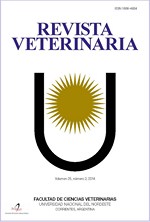Sexual ornaments and productive traits in Campero Casilda hens
DOI:
https://doi.org/10.30972/vet.3326180Keywords:
Index, Wattle index, Sexual maturity, Growth, Egg weight, Feed conversion ratioAbstract
In order to associate the size of sexual ornaments with reproductive and productive characters in hens from the three-way cross Campero Casilda, the comb [CI: length x height] and wattle indices [BI: length x width] were calculated. Individual data were graphed in a Cartesian system (X: IC; Y: IB) which was divided into four quadrants by two lines that intersect each axis at the level of their mean values. Birds with extreme values of both indices [Quadrant I (CI):> CI> IB and Quadrant III (CIII): <CI <IB] were identified and, for each of them, the productive characters at sexual maturity, four indicators of bone development at 30 and 71 weeks, the dynamic patterns of body weight and egg weight and the ratio of feed conversion to eggs in the first part of the laying cycle, were recorded. Birds with greater development of sexual ornaments (a) were precocious and began laying with eggs of lower weight, but with similar regularity and uniformity and presented (b) greater length of the tarsus and femur in both ages, greater diameter of the tarsus at 30 weeks and greater length of the tibia at 71 weeks of age, (c) higher exponential growth rate between the sixth and twentieth week but similar global growth pattern, (d) lower asymptotic egg weight, lower maturation rate for the character and lower theoretical weight of the first egg and (e) higher number of eggs of lower weight and similar feed conversion ratio between 26 and 35 weeks. Size combination of sexual ornaments is presented as an alternative for the early selection of the breeders.Downloads
References
Barbato GF. 1999. Genetic relationships between selection for growth and reproductive effectiveness. Poult Sci 78: 3, 444-452.
Blas J, Perez RL, Bartlett GR, Vineland J, Merchant TA. 2006. Testosterone increases bioavailability of carotenoids: insights into the honesty of sexual signalling. Proc Natl Acad Sci USA 49: 18633-18637.
Bullock J, Hall JC. 1968. Effect of steroid esters on comb growth. World Poult Sci J 24: 328.
Cornwallis CK, Birkhead TR. 2007. Experimental evidence that female ornamentation increases the acquisition of sperm and signals fecundity. P Roy Soc Biol Sci 274: 1609, 583-590.
Eitan Y, Soller M, Rozenmboin I. 1998. Comb size and estrogen levels toward the onset of lay in broiler and layer strain females under ad libitum and restrictes feeding. Poult Sci 77: 11, 1593-1600.
Etches RJ. 1996. Growth and sexual maturation. In: Reproduction in Poultry (Etches RJ Ed), CAB International, Wallingford, UK, p. 96-97.
Fairfull RW, Gowe RS. 1990. Genetics of egg production in chickens. In: Poultry Breeding and Genetics, Chapter 29 (Crawford RD Ed), Elsevier, Amsterdam, The Netherlands, p. 705-759.
Fitzhugh HA. 1976. Analysis of growth curves and strategies for altering their shape. J Anim Sci 42: 4, 1036-1051.
France J, Dijkstra J, Dhanoa M. 1996. Growth functions and their application in animal science. Ann Zootech 45: Suppl. 1, 165-174.
Francesch A, Estany J, Alfonso L, Iglesias M. 1997. Genetic parameters for egg number, egg weight, and eggshell color in three catalan poultry breeds. Poult Sci 76: 12, 1627-1633.
Francesch A, Villalba I, Cartañà M. 2011. Methodology for morphological characterization of chicken and its application to compare Penedesenca and Empordanesa breeds. Animal Genetic Resources 48: 79-84.
Hester PY, Ramamneh DS, Makagon MM, Cheng HW. 2015. Effect of partial comb and wattle trim on pullet behavior and thermoregulation. Poult Sci 94: 5, 860-866. 13. Johnsson M et al. 2012. A sexual ornament in chickens is affected by pleiotropic alleles at HAO1 and BMP2, selected during domestication. PLoS Genet 8: 8, e1002914.
Joseph NS, Robinson FE, Renema RA, Thorsteinson KA. 2003. Comb growth during sexual maturation in female broiler breeders. J Appl Poultry Res 12: 1, 7-13.
Jraves HB, Hable CP, Jenkins TH. 1985. Sexual selection in Gallus: Effects of morphology and dominance on female spatial behavior. Behav
Proces 11: 189-197.
Moro C et al. 2015. Quantitative effect of a CNV on a morphological trait in chickens. PLoS One 10: 3, e0118706.
Mukhtar N, Khan S. 2012. Comb an important reliable visual ornamental trait for selection in chickens. Worlds Poult Sci J 68: 3, 425-434.
Parker T, Ligon J. 2003. Female mating preferences in red jungle fowl: a meta-analysis. Ethol Ecol Evol 15: 63-72.
Pizzari T, Birkhead TR. 2000. Female feral fowl eject sperm of subordinate males. Nature 405: 6788, 787-789.
Pizzari T, Cornwallis CK, Lovlie H, Jakobsson S, Birkhead TR. 2003. Sophisticated sperm allocation in male fowl. Nature 426: 6962, 70-74.
Shen M et al. 2016. Genome-wide association studies for comb traits in chickens. PLoS One 11: 7, e0159081.
Tufvesson BM, Tufvesson B, Schantz T, Johansson K, Wilhelmson M. 1999. Selection for sexual male characters and their effects on other fitness related traits in White Leghorn chickens. J Anim Breed Genet 116: 2, 127-138.
Weatherup S, Foster W. 1980. A description of the curve relating egg weight and age of hen. Br Poult Sci 21: 6, 511-519.
Wright D et al. 2007. The genetic architecture of a female sexual ornament. Evol 62: 1, 86-98.
Wright D et al. 2012. Onset of sexual maturity in female chickens is genetically linked to loci associated with fecundity and a sexual ornament. Reprod Dom Anim 47: 1, 31-36.
Zuk M et al. 1990. The role of male ornaments and courtship behavior in female mate choice of red jungle fowl. Am Nat 136: 4, 459-473.
Downloads
Published
How to Cite
Issue
Section
License
Revista Veterinaria (Rev. Vet.) maintains a commitment to the policies of Open Access to scientific information, as it considers that both scientific publications as well as research investigations funded by public resources should circulate freely without restrictions. Revista Veterinaria (Rev. Vet.) ratifies the Open Access model in which scientific publications are made freely available at no cost online.










.jpg)
.jpg)



